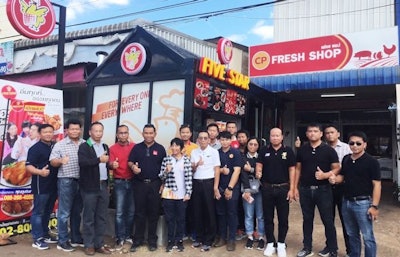
Thailand-based agrifood group Charoen Pokphand Foods Ltd. is supporting the nation’s efforts to limit the effects of the pandemic by protecting vulnerable people, as well as its own employees.
The latest initiative by Charoen Pokphand Foods (CPF) has been to support the creation of new jobs. As many Thais have returned to their hometowns during the present restrictions relating to the novel coronavirus (COVID-19) pandemic, some have been unable to find any work.
Through a series of local projects, CPF is supporting new entrepreneurs to set up shops selling products from the company’s brand. The range includes fresh and frozen chicken, pork, shrimp, sausage, and ready-to-eat (RTE) meals. Two options of different sizes are offered to applicants. For an investment of 5,000 baht (THB; US$155), the fledgling businessperson can set up a CP Community Fridge. Alternatively, a larger initial investment opens the opportunity to sell as wider range of the company’s products from a bigger retail space via the CP Fresh Shop.
According to CPF, it provides support over shop location, and store management, including the rental and installation of refrigerator units. Materials and training will be offered to help boost sales to the new franchise holders.
For the new investor, the clear attraction is the potential of a higher income to support their families. As CPF benefits from the boost to overall sales, the local community has access to a wider range of safe food.
In Thailand, the number of confirmed COVID-19 cases now stands at 2,839, reported Bangkok Post on April 23. Fifty people have died of the disease.
CPF aims to keep workforce, farms, customers safe
In order to protect consumer health, CPF has confirmed its commitment to international standards, guidelines, and codes covering food safety standards. From feed mill and farm, through food processing and logistics, to warehousing and offices, these measures of health and safety are being implemented as a single-standard practice, CPF’s CEO Prasit Boondoungprasert recently said.
As well as a guarantee of product safety and traceability, the measures focus on all CPF employees and food workers on the processing line. In practical terms, the company says it is providing more transport for staff between their home and place of work, as well as allowing for social distancing, and providing more health checks and hand sanitizing stations.
Already in March, CPF announced a series of measures to keep its pig farms and workforce safe during the COVID-19 pandemic. This shielding covered not only the firm’s own farms, but also those of its contract producers.
At each stage of production, the focus was on preventing the entry of disease, said Dr. Damnoen Chaturavittawong,D.V.M., senior vice president of the Swine Veterinary Service Department. Along with general international standards, staff were subjected to daily screening for signs of fever that could be linked to coronavirus infection.
Recently, CPF announced it is helping to care for older residents around its facilities by providing food, funding, and other essential items.
With annual slaughterings of 685 million, CPF is the world’s 6th largest poultry company, according to the WATT Ag Net Top Poultry Companies database. With CP Group as its major shareholder, CPF has an extensive network of agri-food operations in Asia and Europe. It is also the world's largest animal feed producer.
Impacts of the current COVID-19 situation are forecast to include short-term volatility in world poultry markets, according to analyst Mark Jordan. The return to “normal” may be a long way in the future.
View our continuing coverage of the coronavirus/COVID-19 pandemic.
















